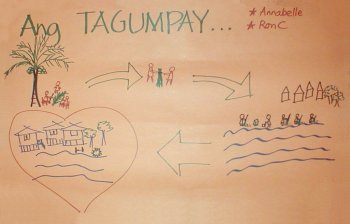Here is an insightful vignette from a 2003 Knowledge and Wisdom Sharing Workshop among best practitioners in sustainable community development conducted by CCLFI.Philippines for the UNDP GEF Small Grants Programme.
Annabelle Echavez, from a fishermen’s association in Bolinao, province of Pangasinan, and Ron Crisostomo, from a coastal resource development organization in Infanta, province of Quezon drew the following, entitled “Ang Tagumpay” (“Success”):
What is “Success”?

Annabelle presented and explained their drawing thus (translated from Tagalog language, shortened and edited while maintaining the essential ideas):
|
For us, the start of development is like making walis tingting. First, the leafy part from each coconut leaflet is removed by a knife to produce one tingting [midriff]. This is like individual discipline: it is difficult or painful but when done, it is a small success by itself. Then, many tingtings are tied together to make a broom. This is community discipline and unity – a bigger success. With a broom you can clean the seashore of garbage. If the community is united and a project answers community needs – when families get their own house, land and livelihood and they can help themselves and the community – then the project is successful. However, that is not the end-all of success. The last stage [last arrow pointing to houses inside a heart] is when you no longer need the broom because every community member understands and respects or feels responsible for the environment, and no longer throws garbage anywhere. That is a far greater success. |
Final success to community members represented by Annabelle and Ron is an inner, intangible change. We at CCLFI.Philippines call it “sustainable living,” in contrast to the formal concept of “sustainable development.” This is the difference pointed out by Masood Ul Mulk of Pakistan between the “private transcripts” of local community members and development workers interacting intimately together, and the “public transcripts” of development institutions, governments and academe.
